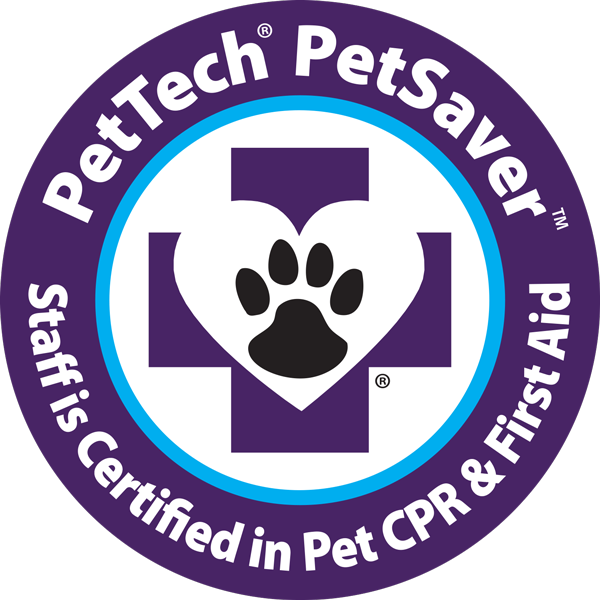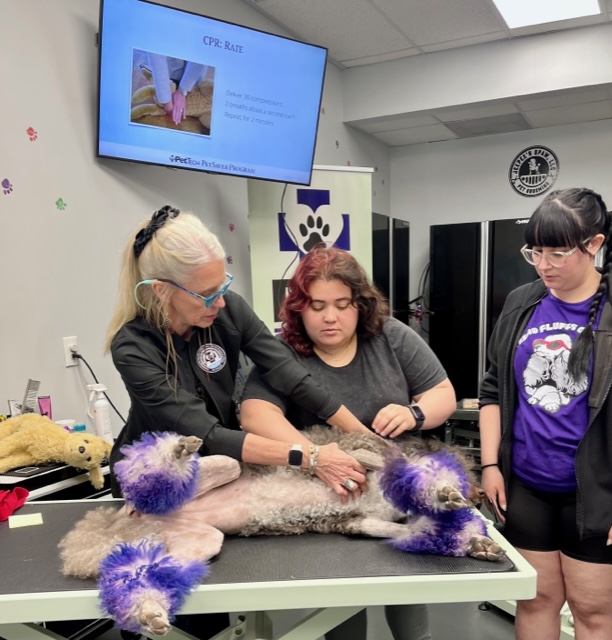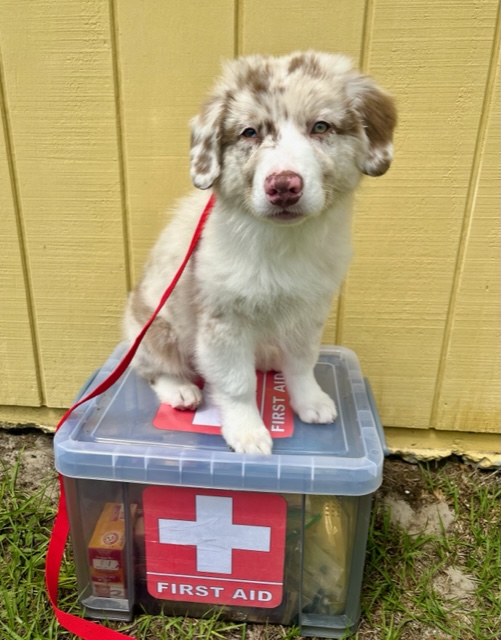Pet First Aid Awareness Month

Did you know that Sunland Acres staff are all Pet CPR and First Aid certified through PetTech?
If your dog or cat had an accident, would you know how to stabilize them before transporting to the vet or local emergency veterinary care center? The goal of Pet First Aid Awareness is to ensure pet owners are aware of basic actions to take in case of a pet related emergency. We are encouraging every pet parent to learn Pet CPR and First Aid!
Safety is always our top priority!
What Situations Require Immediate Veterinary Care?

- Trauma: head, chest or abdomen
- Seizure; prolonged or first time
- Arterial bleeding
- Fractures
- Poisoning
- Shock
- Respiratory distress
- Inability to walk
- Bloat
- Unconsciousness
Biggest Threats in Florida
There can be risk or injury at any place and time, but living in Florida comes with its own specific risks when it comes to your furry friends.
The Ocean- the most dangerous thing for your dog is the ocean water itself. Many thirsty dogs, or overly excited dogs, swallow the salt water which can quickly lead to toxic levels of sodium in your dog. The high levels of salt in the sea water can lead to a fluid imbalance.
Bodies of Fresh Water- Stagnant bodies of water, in warm temperatures, pose the risk of blue-green algae. If you see algae that looks like pea soup, don’t let your dogs swim or drink from it. The toxins in blue-green algae can lead to serious and often fatal illnesses in dogs.

Sago Palms-A decorative plant used frequently in landscaping here, has toxic compounds that can cause irreparable damage to your dog’s health within fifteen minutes of ingesting the plant’s parts. While all parts of the Sago Palm contain the toxin, dogs are also frequently tempted to taste and swallow the large seeds.
Toads and Snakes- The invasive Cane Toad and a handful of native venomous snakes inhabit Florida . The glands on the sides of the Cane Toad contain a potent milky-white toxin which can be fatal if your dog attempts to grab or lick the toad. If your dog comes in contact with one, wash its mouth out with a lot of water and head immediately to the emergency veterinarian. Venomous Floridian snakes are the Eastern Coral Snake, the Southern Copperhead, the Cottonmouth, the Eastern Diamondback Rattlesnake, the Timber Rattlesnake, and the Dusky Pygmy Rattlesnake. If you think your pet has been bitted by a venomous snake, immobilize your pet and head straight to the emergency vet.
Heat- When heat waves in Florida burn you up, can you imagine how it feels to our furry friends? High body temperatures and stress can result in a pet going into heat stroke. Always make sure your pet has access to fresh cool water, shade, and enough air flow. Dogs cool down by panting, making brachycephalic dogs more susceptible. Always practice the “7 second rule” by placing the back of your hand onto pavement, gravel, or sand, before walking your dog. If it is too hot for your hand, it is too hot for your pet’s paws. If you think your dog is overheating, move them to a cool, well ventilated area and wrap their body in a wet, cool sheet or towel. You can also apply cool water to their paws and nose. It is important to never offer a hot pet, ice water, or place ice water on their body, especially their head, as this may result in extreme shock.
First Aid for Your Pet
For times of emergency, it is always best to keep a pet specific first aid kit in your home and in your car. Here is a list of some things you will want in your kit:

- Antibiotic ointment (ensure that it is safe for use on pets)
- Pet specific, non-sticky bandages and tape (do NOT use human adhesive bandages on pets)
- Gauze pads and rolls
- Blunt bandage scissors
- Digital “fever” thermometer
- Plain saline
- Syringe
- Tweezers
- Hydrogen Peroxide
- Antihistamine ex. Benadryl
- Activated Charcoal
- Muzzle
- Slip leash
Additionally always keep on hand a current photo of your pet and your pet’s current medical records in an easy-to-access location (where they won’t get lost), as well as contact information of your vet and contact/location information for the closest pet emergency care facility.




